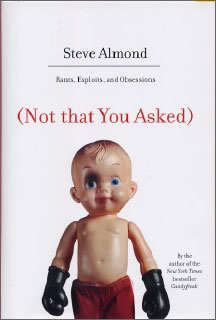 |
 Steve Almond
Steve Almond
(Not That You Asked)
Reviewed by: Rick Kleffel © 2007
Random House
US First Edition Hardcover
ISBN 978-1-4000-6619-3
290 Pages; $21.95
Publication Date: 09-11-2007
Date Reviewed: 10-08-2007
Index:
Non-Fiction
Clever can get you only so far. Monkeys are clever; so are certain birds. They can use tools and get at prey that might otherwise go uneaten. But they don't use tools to record their thoughts in written language. Only humans are afflicted with this disease, and even so, many of them are merely clever when it comes to what they write about and how they write about it. Steve Almond is certainly clever, but he's more than a tool-using mammal. '(Not That You Asked)' is his collection of essays and it goes well beyond clever to hilariously funny, occasionally profound and often profane. Almond writes about a variety of stuff in a variety of styles, with bits that range from pure, virulent satire to personal literary criticism. He'll make you think, make you laugh and ruthlessly make fun of himself. As you read, you'll enjoy an engaging demonstration of the cleverest tool ever devised by cave-dwelling hairless apes.
Almond jumps out of the gate with a bracing burst of bitter bile, 'Dear Oprah'. Now, sure, Oprah Winfrey is an easy target, but Almond puts himself in the crosshairs as well. You may not laugh with Oprah, but you do get to laugh at Almond, which is as close to fair and balanced as you can expect. The mood shifts with 'Every thing Was Beautiful and Nothing Hurt', an extended essay on the enduring power of Kurt Vonnegut, filtered through Almond's attempts to interview The Great Man. Almond is still funny and does a fine job portraying the mishaps of a literary interviewer trying to score a chat with an American literary icon. But we get a good deal more than self-lampooning antics. Almond engagingly reminds readers why Vonnegut was both important and entertaining by effectively exploring his own relationship to the work while pursing a relationship with the writer. The latter may never some to pass, but the former is funny, touching, and intellectually stimulating. In other words, a more-than-clever use of the language as a tool.
Having established a range from the ridiculous to the sublime, Almond's essays then strut their stuff. He writes about sex, in styles ranging from the cringe-worthy 'Shame on Me', in which his mother finds an item no mother should encounter, to the breezy and nearly authoritative 'How to Write Sex Scenes: the 12-Step Program'. He writes about sports and even explains to this heathen why anyone would pay attention to sports. A man who can write about sports and not make my eyes glaze over, in fact who can actually entertain me, is a man who has taken up his tools with an intelligence that suggests he will not he digging grubs from within tree branches his entire life.
Almond's brief encounter with fame heretofore was the release of his book 'Candyfreak', and his even briefer encounter with Reality TV in the form of VH1's show Obsessions makes for wonderful reading. It may hold no surprises with regards to the crass nature of these shows, but clever tool use ensures that readers are actually laughing at Almond as often as with him. Good call. And again, while Almond's encounter with a blogger in 'Blog Love' will hold few surprises so far as content, execution is ever a strong point to be admired. Even his easy-target potshots at the Hateocracy of right-wing talk-TV and radio demonstrate a level of artistry that suggests symbolism rather than mere tool-use. If you agree with his politics, you laugh with him; if not, you laugh at him. Win-win. And 'Where'd You Hide the Body?' is a powerful observation of the conjunction of culture and conflict — a new way of looking at the war being fought in Iraq. The book concludes with writing about Me, Me, Me — or rather, Him, Him, Him. He does a particularly good job encoding the insane fears of a new father, painting a perfect picture of the world turned into a giant Rube-Goldberg device aimed to turn the first-time father into a Killer of His Own Child. Better to laugh at someone else's fears than experience your own.
'(Not That You Asked)' is an excellent tool for readers seeking entertainment leavened with elegance and education or elegance and education leavened with entertainment. Choose the direction you wish to travel and turn the tool either clockwise or counter-clockwise. Unscrew stuff and then put it all back together again while cramming in a few laughs alongside some trenchant thoughts and observations. You'll be glad you asked.
|
 |
